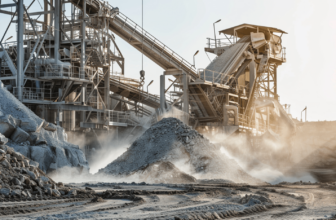Crushing technology has been a fundamental part of industrial processes for centuries, but like all aspects of our tech-driven world, it, too, is evolving. This article will discuss how innovative crushing technology is transforming industries, offering not only economic and productivity benefits but also improving safety and reducing environmental impact.
The Evolution of Crushing Technology
From the primitive mortar and pestle to the technologically advanced machines of today, crushing technology has come a long way. In the earliest days, crushing was a manual and labor-intensive process. It was eventually mechanized during the Industrial Revolution, which introduced steam-powered devices and, later, electric crushers.
Throughout the 20th century, technological advancements led to the introduction of hydraulic systems, vibratory feeders, automated conveyors, and more. Despite these advancements, traditional crushers are still relatively inefficient, high maintenance, and potentially hazardous, leading to the advent of more sophisticated, efficient, and safe crushing technologies.
Cutting-Edge Crushing Technologies
Modern crushing technology has brought us to a new frontier: digitalization, automation, and artificial intelligence. Examples include remote operation and control, sensor-driven performance tracking, and predictive maintenance.
One such technology is intelligent rock crushing, which leverages machine learning algorithms to enhance performance. It can optimize operating conditions in real-time based on factors such as feed material characteristics and wear part condition. This increases the overall efficiency and lifespan of the equipment while reducing maintenance requirements.
Another development is the use of robotics in crushing technology. Robotic crushers can maneuver in tight spaces, enabling more precise crushing. This precision is further enhanced by using 3D imaging technology and IoT sensors, which provide real-time feedback to optimize operations.
Benefits and Advantages of Innovative Crushing
Enhanced Efficiency and Productivity
Advanced crushing technologies have significantly improved efficiency and productivity. Intelligent systems can adjust operations on-the-fly, reducing downtime and maintenance requirements. Robotic systems can operate in hazardous or hard-to-reach areas, further improving productivity.
Improved Safety and Environmental Impact
Innovative crushing technology also enhances safety. Remote operation and automation reduce the need for human intervention, minimizing the risk of accidents. Moreover, precision crushing technology reduces dust production and noise pollution, mitigating environmental impact.
Cost Savings and Economic Benefits
Innovative crushing technologies can provide significant cost savings. The increased efficiency and reduced downtime result in lower operational costs. Additionally, predictive maintenance capabilities minimize repair costs and extend the lifespan of the equipment. Over time, these savings can contribute to substantial economic benefits for companies.
Future Perspectives: The Potential of Innovative Crushing
The future of crushing technology is promising, with the potential for even more significant advancements. We expect further development in areas such as machine learning, AI, and robotics, leading to smarter, safer, and more efficient operations.
Sustainability will also be increasingly important as companies seek to reduce their environmental impact. This could lead to the development of new crushing techniques that minimize energy consumption and waste production.
The industry is also likely to continue its trend towards customization, with crushing solutions designed to meet the unique needs of specific applications and industries. This could involve everything from modular designs that can be easily reconfigured to systems that can adapt to changing feed characteristics in real-time.
Integration of Innovative Crushing in Different Industries
Innovative crushing technologies have found their way into various industries, each harnessing their potential to enhance their unique operations.
Mining Industry
Mining has always been at the forefront of embracing crushing technology. With the increased demand for minerals and metals, efficiency is paramount. Smart crushing technology has become integral to the industry’s efforts to streamline operations and reduce costs. For instance, AI-powered crushers provide predictive maintenance, significantly minimizing downtime and improving overall productivity. Also, robotic crushing solutions enhance precision, which is crucial for ore processing, where maintaining product quality and consistency is vital.
Construction Industry
In the construction sector, innovative crushing technology has reshaped material processing. Advanced crushers can handle a variety of materials, including concrete, asphalt, and construction waste, providing high-quality, reusable aggregates. This not only saves on the cost of raw material procurement but also contributes to the industry’s sustainability goals. Moreover, sensor-based sorting systems have been introduced in demolition processes, enhancing waste segregation and recycling rates.
Waste Management and Recycling
Innovative crushing has made significant strides in the waste management and recycling industry. Precision crushing has enabled more effective separation of materials for further processing and recycling, particularly in plastic and electronic waste recycling. Automation and AI in crushing processes have facilitated handling large volumes of waste, boosting the efficiency of recycling plants and reducing their environmental footprint.
Food Processing and Agriculture
Although less apparent, the food processing and agriculture sectors have benefited from innovative crushing. New technologies have led to the development of machinery that can crush grains, seeds, and other agricultural products more efficiently and with greater precision. This results in improved product quality, lower energy consumption, and increased throughput.
Ultimately, innovative crushing technology has permeated a wide range of industries, providing transformative solutions to traditional operational challenges. As technology evolves, it continues to redefine processes, bringing greater efficiency, sustainability, and profitability across the board. Its integration signifies an industrial shift toward embracing innovation and represents a promising future for crushing technology in diverse sectors.
Final Thoughts
As we traverse the technological landscape, it’s clear that innovative crushing technology holds immense promise for industrial processes. Revolutionizing traditional methods unlocks an array of benefits, from improved efficiency and productivity and enhanced safety standards to considerable economic gains. Its capacity to minimize environmental impact further underlines its relevance in today’s sustainability-conscious world.
The advent of intelligent systems, robotics, and machine learning has not just propelled crushing technology forward but has also set a robust foundation for the future. With further advances expected in these fields, the prospects for smarter, safer, and more sustainable crushing solutions are promising.
Moreover, as industries increasingly adopt a tailored approach, customization will become more integral to crushing technology. With this comes the anticipation of modular designs and adaptive systems that address the specific needs of diverse applications and sectors.
In the grand scheme of things, the innovative crushing technology is more than a revolutionary tool; it’s a testament to human ingenuity and the relentless pursuit of efficiency. And as we look ahead, one thing is clear: the crushing technology of tomorrow promises to be as transformative, if not more so, than that of today.







